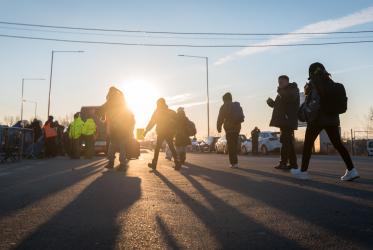Presentation by the Director of the CCIA to the conference convened at FAO headquarters by the UN Special Committee on Palestine, Rome, 18-19 February 1999.
Mr Chairman, President Arafat, Excellencies, Friends,
I have the honor to bring you the greetings of Dr Konrad Raiser, General Secretary of the World Council of Churches on the important occasion of this Conference organized by the Committee on the Exercise of the Inalienable Rights of the Palestinian People to mobilize international public opinion in pursuit of the aims outlined in Res. 53/27 of the United Nations General Assembly.
The World Council of Churches has warmly endorsed and joined in the appeal for the Bethlehem 2000 Project. In his letter to President Arafat on the occasion of the Brussels Participants Conference, Dr Raiser underscored the attachment to Bethlehem of the WCC and its 330 member churches in some 125 countries around the world, and our commitment to the Palestinian people who call it home.
We have long supported these living stones in affirmation and in deed, Dr Raiser wrote. For fifty years we have been engaged in support to refugees and displaced persons, the building of significant educational, medical and social institutions and facilities. We have made important financial contributions to Palestinian cultural, economic and social development programs.
Thus as the end of a century which has brought so much pain and suffering to the Palestinian people draws near we are acutely aware of the urgent, continuing development needs of Palestine. ... This is undoubtedly the time for the international community to commit itself also through generous multi-lateral support for Palestine, its infrastructure and its people. Development and peace do indeed go hand in hand. The Bethlehem 2000 Project has the potential of being a significant stepping-stone to a new millennium and a new era of peace in the Holy Land.
Responsible tourism
Long ago, the World Council of Churches recognized that while thousands of Christians belonging to our member churches gained spiritual nourishment and renewal from pilgrimages to holy places or visits to biblical sites in Israel and Palestine, very few such visitors were exposed to the daily life of the Palestinian society. Thus, for more than two decades, the WCC has supported, in cooperation with the Middle East Council of Churches, programs of responsible tourism to the Holy Land to remedy this situation wherever possible. Through such visits, very many Christians around the world have gained deeper insights not only into their faith, but also a greater understanding of the socio-political and faith realities of the Holy Land. New, strong bonds of friendship and solidarity have been established between visiting Christians and their Palestinian brothers and sisters. As a result, many have become deeply dedicated to the pursuit of peace with justice.
We are encouraging member churches to build upon this concrete experience, and to participate in the Bethlehem 2000 Project as an opportunity to expand upon and deepen the awareness and relationships which have been established. Recognizing the enormity of the task, churches around the world are seeking ways to assist the local Christian communities in and around Bethlehem to make their own contributions to the success of the Project.
Pilgrimages for Peace
Two thousand years after the birth of Jesus, who, Christians believe, was proclaimed by the prophets as the Prince of Peace, the land of his forebears still longs for the peace Jesus taught, a peace built upon love and forgiveness. Mistrust and fear prevail between Palestine and Israel. Economic disparity, struggles over control of vital land and resources continue to sow the seeds of animosity, violence and insecurity for all.
A just and lasting peace must be built upon the pillars of
- comprehensive economic development based on open borders and free movement of people, goods and capital,
- wide-ranging people-to-people contact at all levels of Israeli and Palestinian society, and
- political agreements answering to the national and strategic interests of both peoples.
We remain convinced that there is a will among people in both Israel and Palestine, among faithful Jews, Muslims and Christians, to strengthen these foundations of peace. Sadly, however, Bethlehem risks on this occasion to become not a universal symbol of peace, but rather a focus of continuing confrontation. Israel's declared intentions to expand the Har Homa settlement, and to exploit the millennium celebrations at the expense of Bethlehem are deeply troubling.
The Bethlehem 2000 Project should not be seen as a threat or as an invitation to competition, but rather as a welcome opportunity to build strong foundations for peace by narrowing the economic gap between Israel and Palestine. The building of a solid, self-sufficient economic infrastructure for Palestine with its promise of well-being and economic equality for Palestinians should be viewed as an opportunity for Israel, a chance for peaceful cooperation.
We therefore hope that tourists, pilgrims, Christian and Muslim Palestinians, Jews, and people of other faiths will have free access to the celebrations in Bethlehem in the year 2000, and that this will be a period in which people from Israel, Palestine and many other lands who love and pursue peace will be able to meet and build upon their shared aspirations.
Concluding remarks
It is, therefore, Mr Chairman, Excellencies, Friends, with these hopes and aspirations in mind that the World Council of Churches again offers its encouragement and support for the Bethlehem 2000 Project. We shall be encouraging Christians from around the world to take this opportunity to visit Bethlehem as peacemakers and bridge-builders, on a pilgrimage of faith, bringing with them a message of love and hope that the message of Jesus the Christ, the Prince of Peace may be realized in our time.



